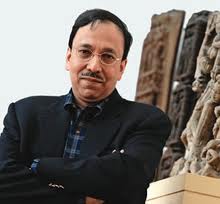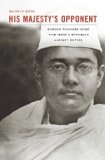Contribute
| Lokvani Talks To Harvard Professor Dr. Sugata Bose |
Nirmala Garimella
04/21/2011
Gardiner Professor of Oceanic History and Affairs Sugata Bose parses the life of Indian revolutionary Subhas Chandra Bose, who struggled to liberate his people from British rule and led the Indian National Army against Allied Forces during World War II. Dr Sugata Bose's field of specialization is modern South Asian and Indian Ocean history. He obtained his Ph.D. from the University of Cambridge. He was a recipient of the Guggenheim Fellowship in 1997. Given your connection to the family, how did you feel in writing this biography? Although Bose was an uncle of my father Sisir Kumar Bose, my earliest recollection of hearing about him is from the stories of men and women who worked with him when they visited our home in Calcutta. Like millions of others, I knew him only as Netaji “revered leader’ a fierce patriot and who fought for India’s freedom In 1990, I jointly started the completed works and write in my preface my hesitancy in writing a book at the time but at the insistence of my editors and publishers here and Penguin India, I finally decided to go ahead.. What class of resources did you refer in writing this book ? Great care has been taken to write it as a historian based on scholarly research, archives and letters to sister, grandfather, uncles, wife, mother etc. The last biography written by him by Leonard Gordon was very well written. Since then however new information has emerged. Perhaps the least known aspect of Netaji Subhas Chandra Bose's many-sided personality was his love for Emilie Schenki, his Austrian wife whom he met in June 1934 in Vienna, developed a close relationship during his forced European exile, secretly married her in December 1937, and had a daughter; Anita in November 1942.One hundred and sixty-two of his letters, written between 1934 and 1942, are part of this biography and give a glimpse of the sensitive and human side of his personality. Describe to us the process of writing this biography? I was on sabbatical leave in India when I wrote this. It is hard to say when it started because it has been a lifelong chronicling of events. While growing up, I remember Abid Hasan recalling the thrilling story of the hazardous submarine voyage he took with Netaji or SA Iyer sharing anectodes about Netaji’s time in Singapore and listening to Lakshmi Sahgal on the formation of a woman regiment of the Indian National Army in 1942 or my own father helping him escape from India. It goes back a long way. Written in the context of global history, Europeon history and south east Asia with all the tumult in the region, this book is for the global student., All of the freedom fighters started in a global sphere whether it was Gandhi in South Africa or Bose in South East Asia. It is the climax that takes place in India While being a fierce patriot and a freedom fighter, you write that Bose was a lover of art and music? Oh yes, he was a great lover of philosophy, art, music and literature,. He enjoyed reading extensively both Indian and European writers. While in Japan he visited Art museums and in prison he demanded from the governor of Burma permission to play music in prison saying “If man is regarded as a being possessing of soul, music is as much a necessity as food and drink†His best friend was Dilip Kumar Roy, - a singer and he also composed a book of songs in Mandalay Bay. The INA had a active orchestra that composed anticolonial music. It seems that Bose seemed ahead of the times with his revolutionary ideas He was a great visionary – ahead of his times because when everyone talked about dominion status he was for complete independence, when others talks about complete independence, he was for parallel government and a separate identity. He was thinking much ahead of others with ideas for a free India. If Bose was alive today, What would be his relevance in today world ? He was a forward looking individual. India was always viewed as part of the larger world. His beliefs and values are still very relevant. He always believed that while we learn to adapt from world values, at the same time India can also teach the world. He was a statesman and one to emulate. If he was living now he would have played a great part in economy and world affairs. His was a unifying figure – all religions and faiths were treated equal and he treated each one with respect – In today's world of bigotry and hatred it is relevant. .---------------------------------------------------------------- Dr Sugata Bose presents his book at the Harvard book store on April 29th at 3pmIn a new biography of the revered Indian nationalist,†His Majesty’s Opponent: Subhas Chandra and India’s Struggle Against Empireâ€Sugata Bose deftly explores a charismatic personality whose public and private life encapsulated the contradictions of world history in the first half of the twentieth century. He brilliantly evokes Netaji’s formation in the intellectual milieu of Calcutta and Cambridge, probes his thoughts and relations during years of exile, and analyzes his ascent to the peak of nationalist politics. Amidst riveting accounts of imprisonment and travels, we glimpse the profundity of his struggle: to unite Hindu and Muslim, men and women, and diverse linguistic groups within a single independent Indian nation. Finally, an authoritative account of his untimely death in a plane crash will put to rest rumors about the fate of this “deathless hero.â€
This epic of a life larger than its legend is both intimate, based on family archives, and global in significance. His Majesty’s Opponent establishes Bose among the giants of Indian and world history.
You may also access this article through our web-site http://www.lokvani.com/

